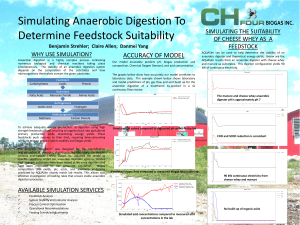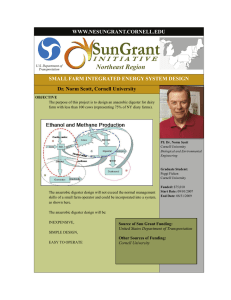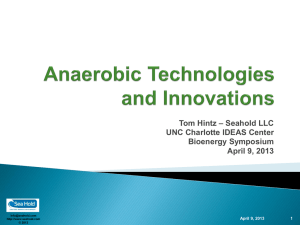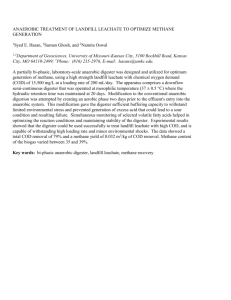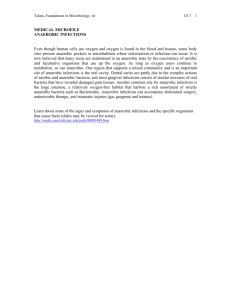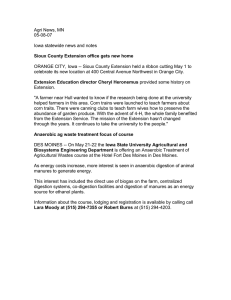Wallace's Farmer, IA 05-17-07 Economics of Producing Methane From Manure Is Improving
advertisement
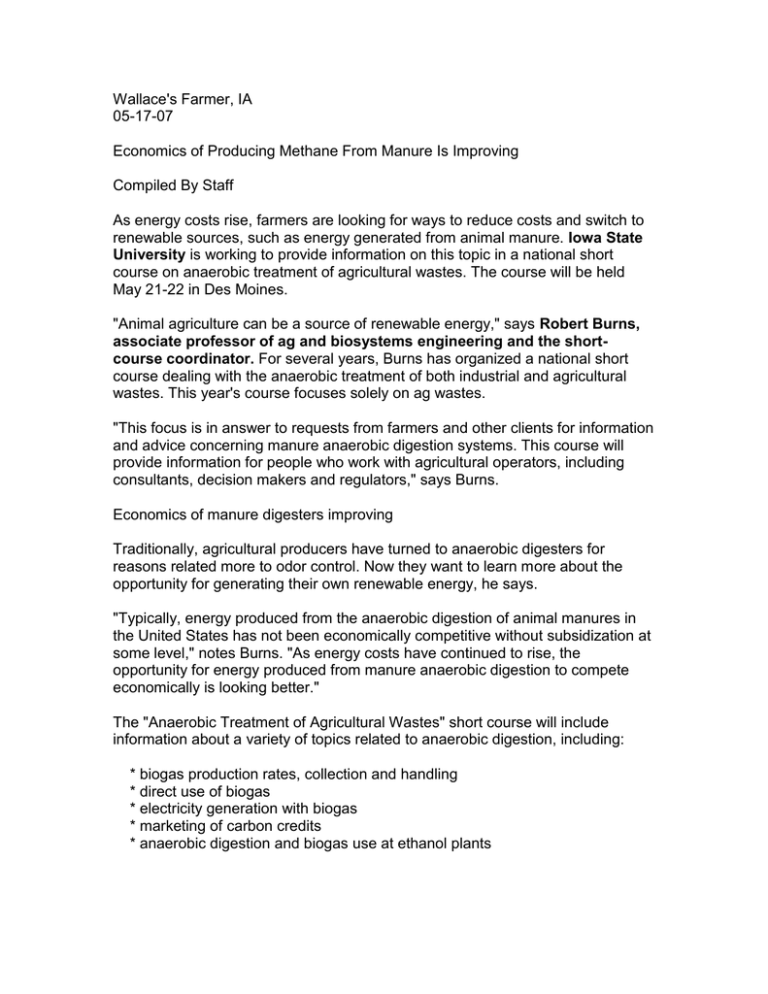
Wallace's Farmer, IA 05-17-07 Economics of Producing Methane From Manure Is Improving Compiled By Staff As energy costs rise, farmers are looking for ways to reduce costs and switch to renewable sources, such as energy generated from animal manure. Iowa State University is working to provide information on this topic in a national short course on anaerobic treatment of agricultural wastes. The course will be held May 21-22 in Des Moines. "Animal agriculture can be a source of renewable energy," says Robert Burns, associate professor of ag and biosystems engineering and the shortcourse coordinator. For several years, Burns has organized a national short course dealing with the anaerobic treatment of both industrial and agricultural wastes. This year's course focuses solely on ag wastes. "This focus is in answer to requests from farmers and other clients for information and advice concerning manure anaerobic digestion systems. This course will provide information for people who work with agricultural operators, including consultants, decision makers and regulators," says Burns. Economics of manure digesters improving Traditionally, agricultural producers have turned to anaerobic digesters for reasons related more to odor control. Now they want to learn more about the opportunity for generating their own renewable energy, he says. "Typically, energy produced from the anaerobic digestion of animal manures in the United States has not been economically competitive without subsidization at some level," notes Burns. "As energy costs have continued to rise, the opportunity for energy produced from manure anaerobic digestion to compete economically is looking better." The "Anaerobic Treatment of Agricultural Wastes" short course will include information about a variety of topics related to anaerobic digestion, including: * biogas production rates, collection and handling * direct use of biogas * electricity generation with biogas * marketing of carbon credits * anaerobic digestion and biogas use at ethanol plants Presenters will include Iowa State University faculty members, as well as experts from other academic institutions, government and industry. Ethanol plants could be run on manure Burns will address the current status of animal manure anaerobic digestion. His session looks at U.S. and international perspectives, biogas production costs, electrical power generation costs and the current outlook. Robert Anex, associate professor in agricultural and biosystems engineering and associate director of ISU's office of biorenewables programs, will address operating ethanol production plants using biogas from anaerobic digesters. This includes economic drivers for integrated anaerobic digester biogas and ethanol processes, system configurations, energy efficiency tradeoffs, nutrient balances and nutrient recovery and system environmental performance. "The primary reason agricultural producers use an anaerobic digester is to control odor," Anex says. "The applications for the bioeconomy are still being explored. Benefits of using an anaerobic digester include reducing water use and generating energy, such as using biogas to replace natural gas or coal." Co-ops could own manure digesters Sometimes individual farmers are interested in using the technology, but cannot afford to build or operate an anaerobic digester on their own. Part of the course, to be delivered by Pete Flynn from University of Alberta, will share information on centralized digesters, which Burns says allows farmers to benefit from the anaerobic digestion of manure without owning and maintaining a digester. "Most farmers are interested in producing milk or meat rather than running a digester," Burns said. "With a centralized digester, several farmers can join together to build one and transfer their manure to the centralized unit. There are also other opportunities for codigestion, which could include the mixing of different wastes from agriculture, industry or cities in a single digester." Other sections of the short course will review case studies. The E3 biofuels company will share information about the potential synergy between animal agriculture and ethanol plants. Burns says the firm will share information from the system near Mead, Neb., which links a beef feedlot and an ethanol plant. Use feedlots to run ethanol plants "There is a lot of interest in the synergy between a feedlot and an ethanol plant," says Burns. "It can be a circle of producing ethanol with biogas, then using the ethanol coproduct of dried distillers grains to feed the cattle, which creates manure that is processed in an anaerobic digester to create biogas." Anex sees a growing role for anaerobic digesters in this type of operation. "People are very interested in energy required to produce ethanol," he says. "People are asking whether you get more energy out of corn grain ethanol than you put in. With the type of dry grind operation at Mead, Neb., that's a definite 'yes.' By generating their own biogas, they are decoupled from nonrenewable sources of energy. There's a growing role for anaerobic digesters in the emerging bioeconomy." Shihwu Sung, associate professor of civil, construction and environmental engineering at ISU, will provide an overview of the anaerobic digestion process, including advantages and disadvantages of anaerobic systems and the role of anaerobic digestion in a biorefinery. Sung will focus on technologies that currently are used in full-scale animal agriculture operations. He will review biorefinery concepts that include several sources of biomass: trees, grasses, agricultural crops, agricultural residues, animal wastes and municipal waste sludge. Through anaerobic conversion processes, these biomass feedstocks can become fuels, energy, and chemicals. Anaerobic biotechnologies treating swine, cattle and poultry wastes include: * anaerobic lagoon * complete mix anaerobic digester * plug flow anaerobic digester, upflow anaerobic sludge blanket reactor * anaerobic filter * anaerobic sequencing batch reactor and * temperature-phased anaerobic digester The short course will be held at the Hotel Fort Des Moines. More information, including agenda and registration details, is available at www.ucs.iastate.edu/mnet/anaerobiccourse/home.html
